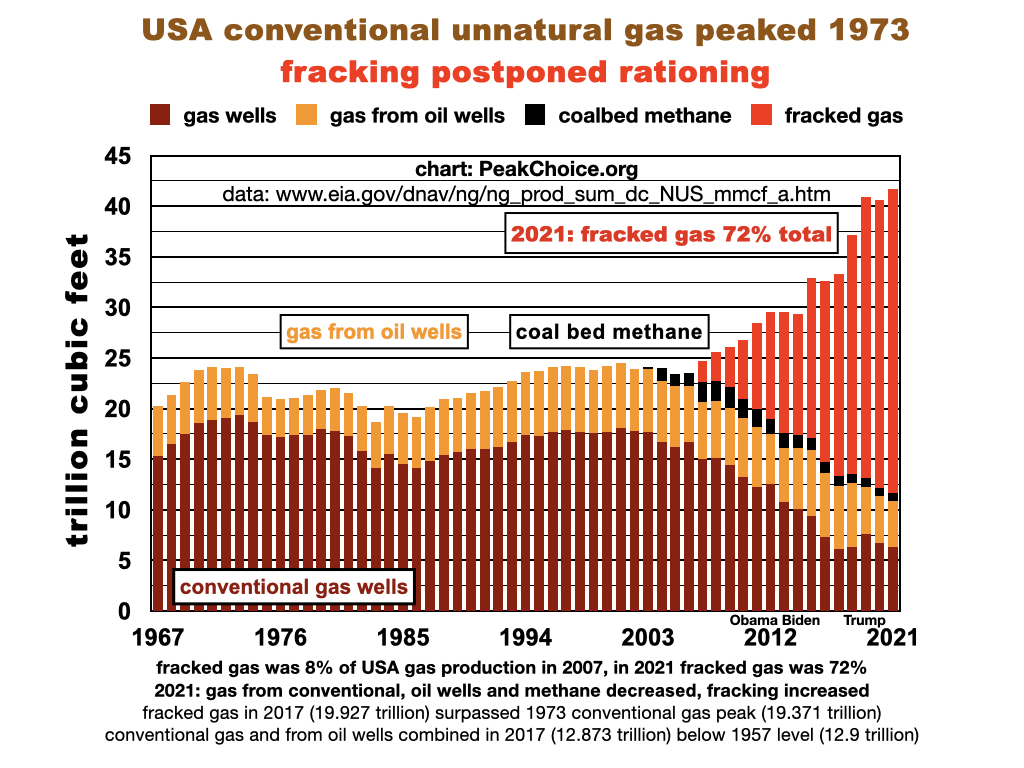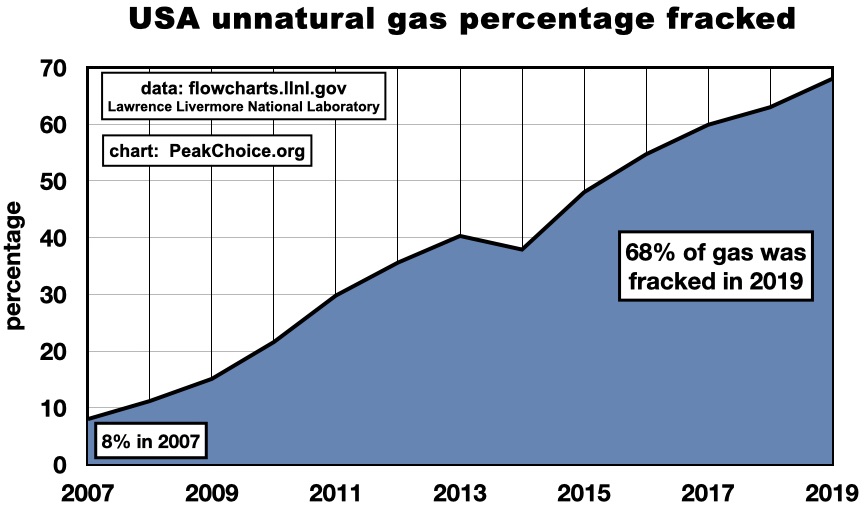Peak Choice:
Cooperation or Collapse
by Mark Robinowitz
Covid, climate and the Limits to Growth - Earth, energy, money - an uncensored guide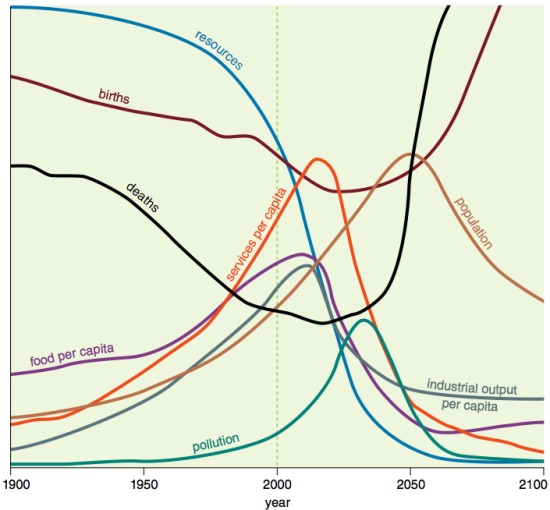
This projection (right) from the 1972 "The Limits to Growth" was an early effort to make a computer model of the future of civilization from the perspective of finite resources on a round, abundant, finite Earth. Its authors did not intend this as a precise prediction. This was a generalized effort to guess what would happen if we pretended "growth" could continue forever and ignored physical reality.
Limits to growth as a paradigm, explains the otherwise confusing slow collapse we are all experiencing and co-creating.
The most important question facing the human race is how we respond to the interconnected crises of Peak Oil, climate change, overconsumption, overpopulation, and other resource conflicts.
How we use the remaining oil determines the future of the human race:
- do we "spend" it on solar panels or battleships?
- on relocalizing food production or further globalization of production?
- more superhighways or better trains and transit?
- more coal, oil and nuclear, or more renewable energy systems?
- relocalization everywhere or global war to fight over the last supplies of non-renewables (fossil fuels and minerals) and renewables (fresh water, farmland, fish)?
The environmental and peace movements are needed to help develop peaceful, permaculture responses to "Peak Everything" -- the biggest problem ever faced by humanity. It takes oil to build renewable energy equipment, and nearly everyone (living above the level of subsistence agriculture) eats food that is grown and distributed with fossil fuels.
The global crises of the end of cheap oil and the start of climate change require global levels of solutions (relocalize everywhere). We are not merely at peak oil, we are at peak technology, peak money, peak communication. Real solutions would require us to redirect the energy, talents, resources, etc. of global capitalism, the military industrial complex, universities, media and other pillars of our society.
We have enough resources and talent to shift civilization to create a peaceful world that might be able to gracefully cope with the end of concentrated fossil fuels, or to create a global police state to control populations as the resources decline. We don't have the ability to have a peaceful world while embarking on a World War over the last of the fossil fuels that power civilization.
Understanding why civilization did not respond to the warnings of overshoot decades ago is needed if a shift toward sanity is still possible at this late date. This is a simple question that has a complicated answer - since these decisions were not made democratically. Addressing Peak and Climate would require world peace instead of Peak Oil Wars.
We are not "addicted" to oil -- the modern world is completely dependent upon fossil fuels for industrial agriculture systems, transportation networks, and the growth based monetary system. Addictions are things you can give up -- but oil runs our civilization.
100% renewable energy is a certainty since non-renewable fossil fuels and mineral ores are finite. However, 100% renewable does not guarantee our future consumption can be equal to "current" usage.
Covid closures cut energy use more than climate activism
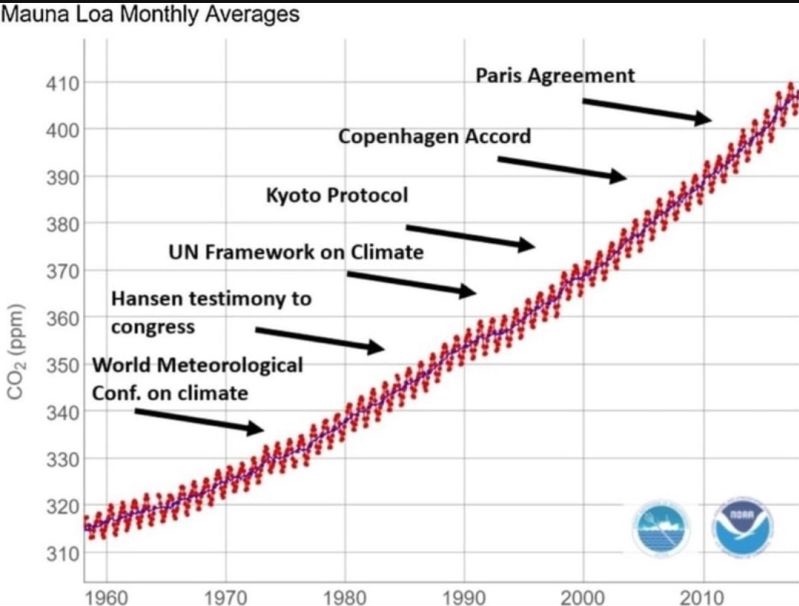
A "quad" is a quadrillion BTUs. One BTU is roughly equal to striking a match. Covid closures to mitigate the pandemic reduced energy faster than any previous event, policy, protest. Now that we may be past "peak Covid" the global economy is trying to grow again but there are obstacles, notably peak oil and gas, depletion of nearly everything, increasing complexity that leads to disruptions. "Involuntary simplicity" lies ahead.
David Holmgren, co-originator of permaculture, said in "Future Scenarios" that recession is the most effective means to reduce consumption. But covid was even more effective. The disruptions of pandemic mitigation caused a dip in "growth" that was intensely unpopular. What reaction will most people have with the arrival of permanent energy rationing on the downslope of availability?
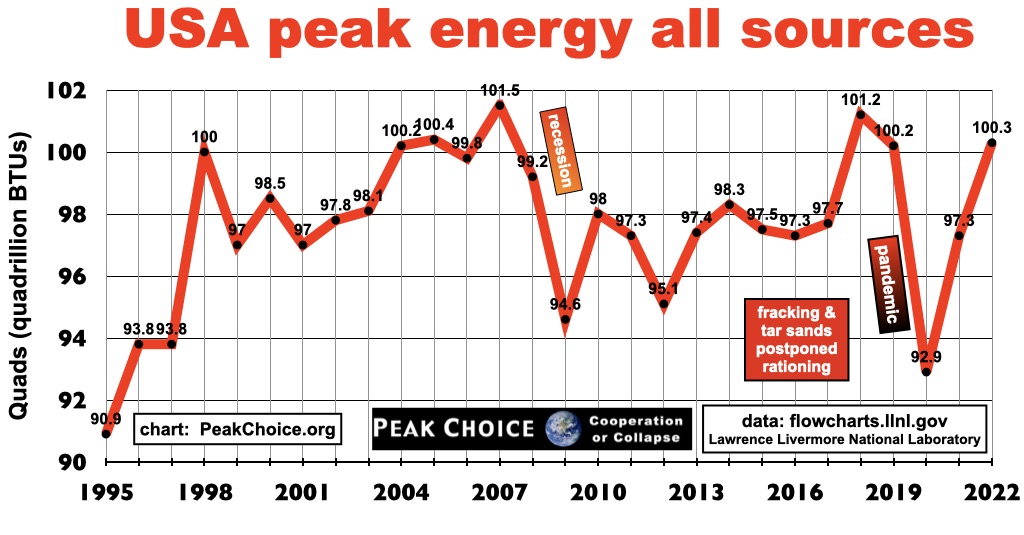
Covid closures caused the sharpest decline of driving since World War II rationing
Covid was a heart attack for transportation and energy systems. Can we heed the implications for overconsumption, exponential growth on a finite planet?
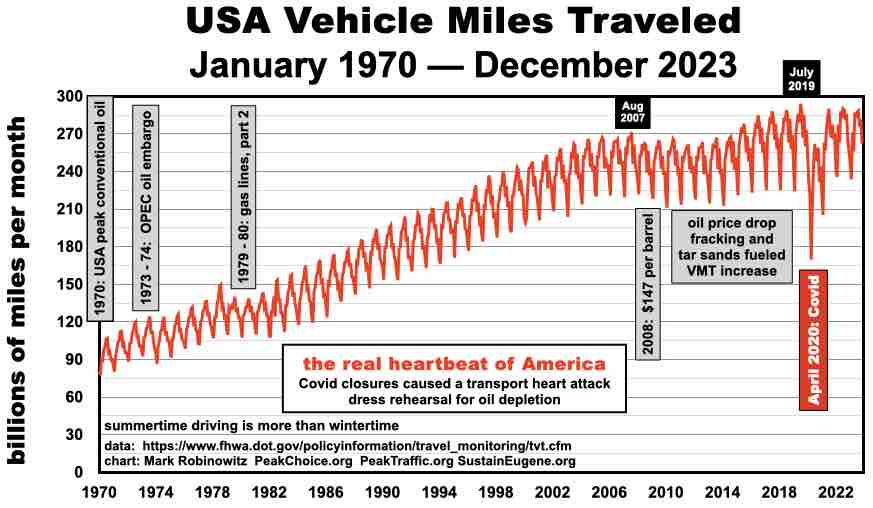
This decline of driving was seen everywhere, including Oregon (where I live).
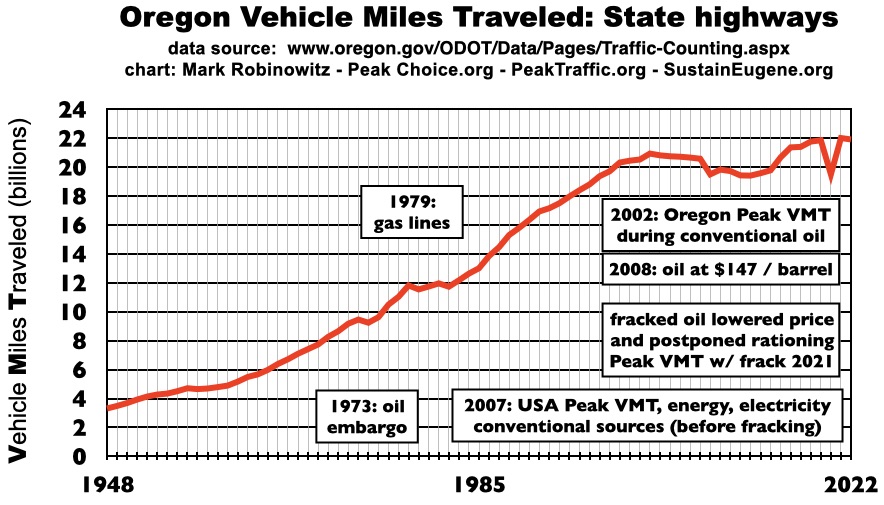
Covid cut greenhouse gas emissions from transportation: cars, trucks, trains, ships, planes. The chart below was copied from the United States Energy Information Administration (it's public domain, no copyright).
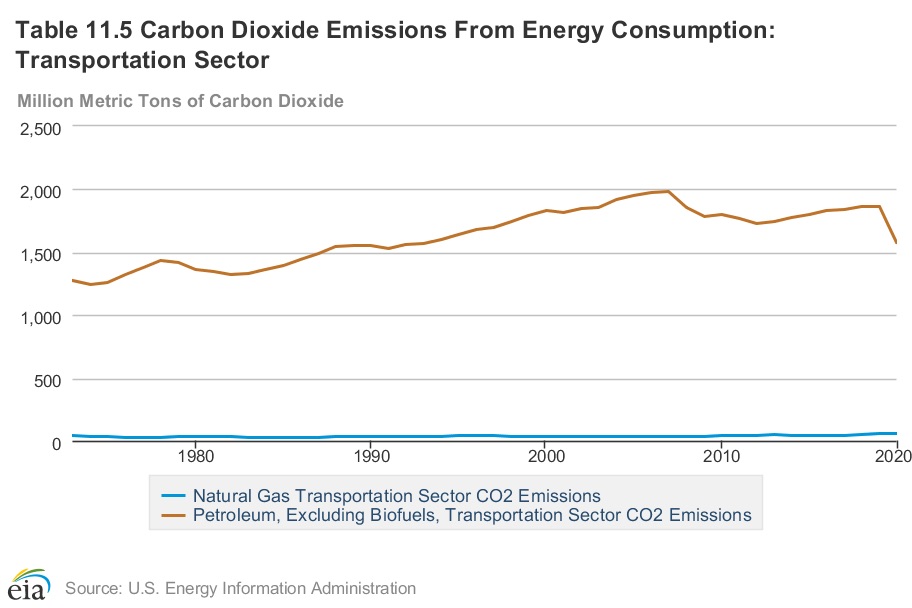
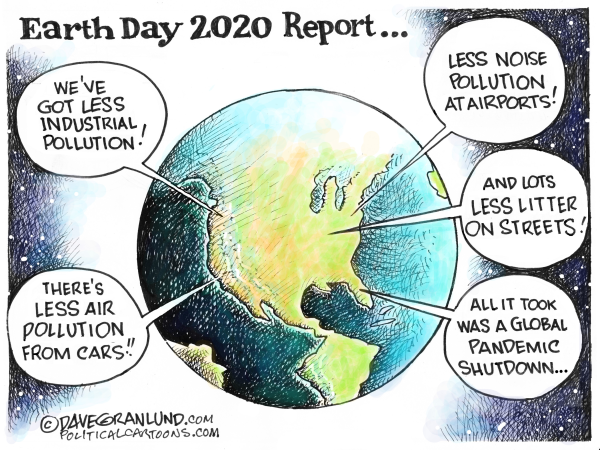
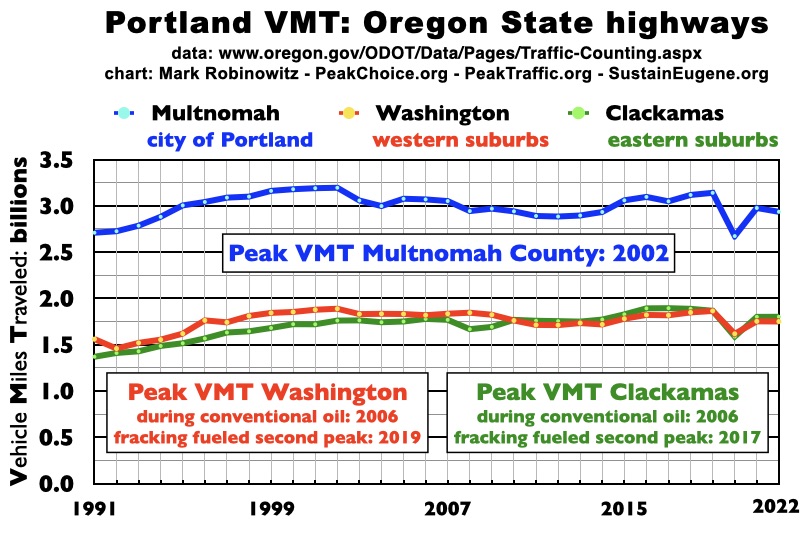
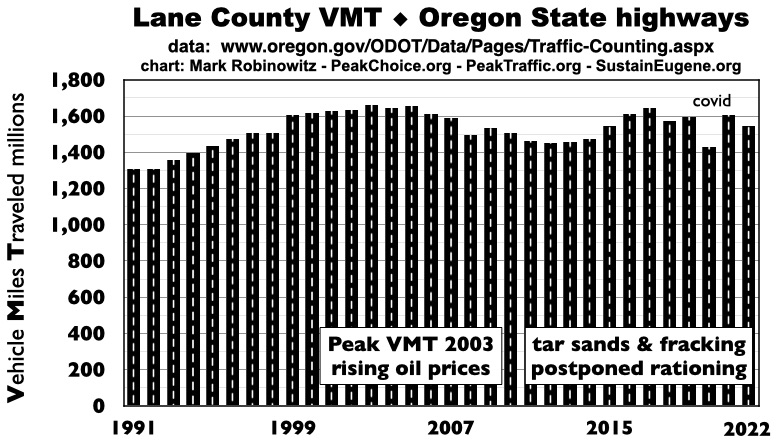
Covid closures caused the sharpest drop of travel in aviation history
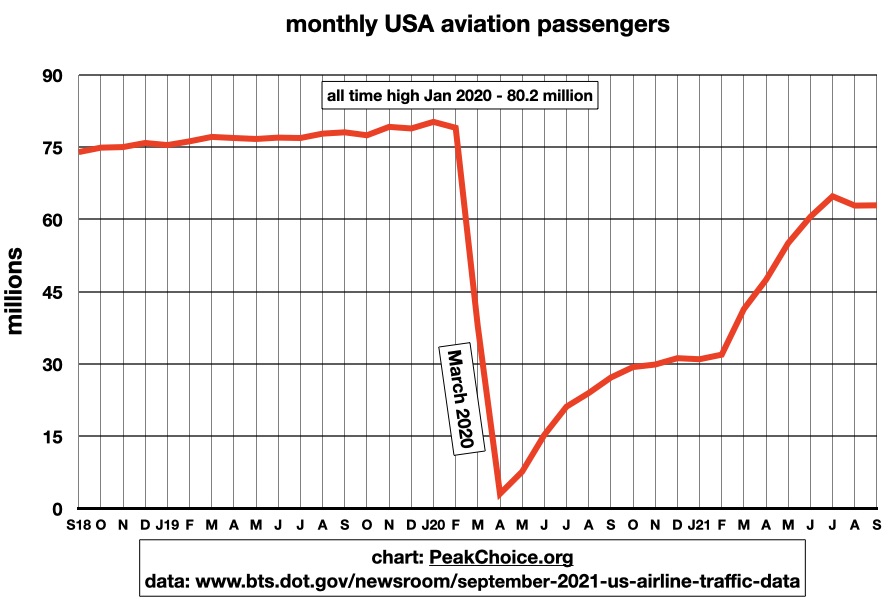
Fracked oil and gas had sudden drops in early 2020
(graphs from U.S. Energy Information Administration)
Oil consumption dropped faster at the start of the pandemic due to less driving. Unnatural gas is not used (much) for transportation - it powers electric grids and heats buildings. Both of those uses did not decline as sharply due to covid closures as did driving.
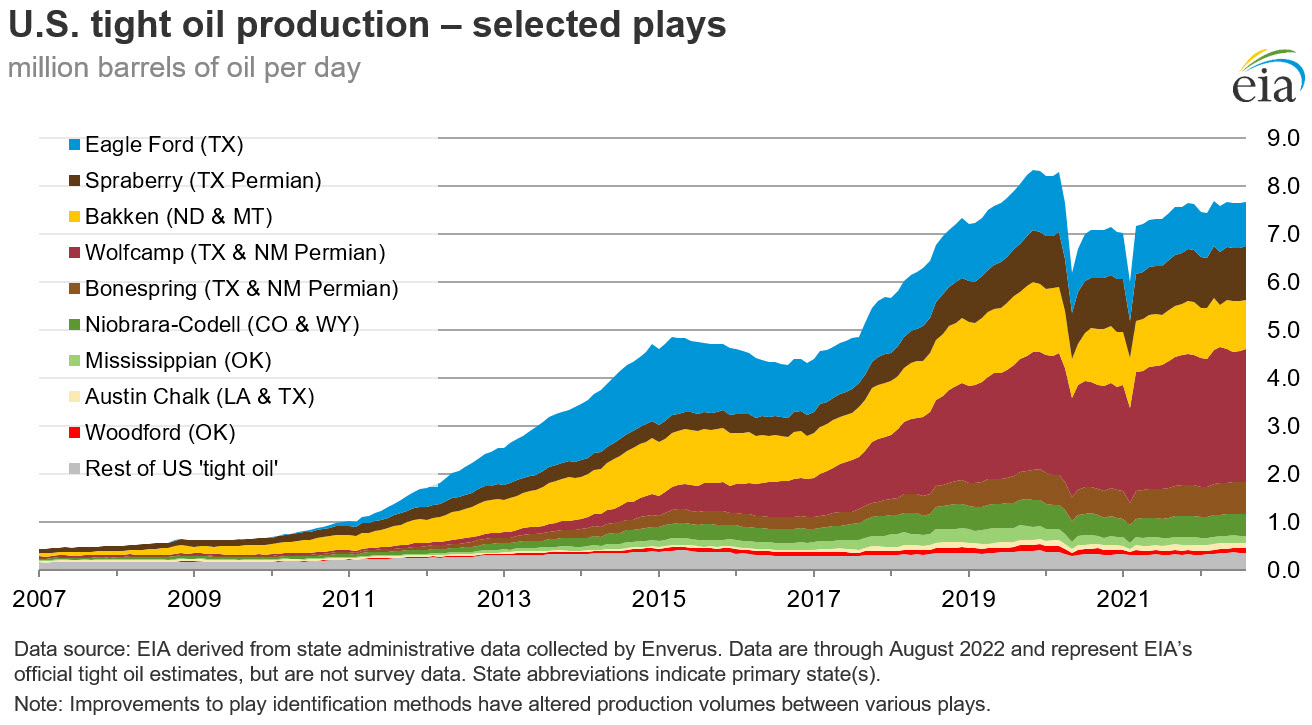
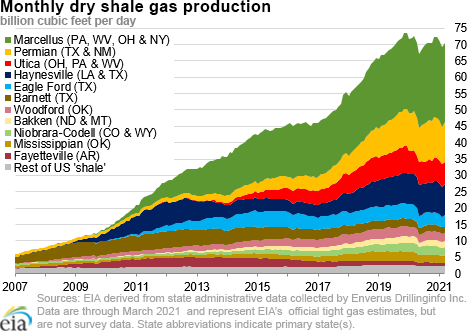
Conventional unnatural gas peaked in USA in 1973.
It has been mostly replaced by unconventional fracked gas.
Fracking (for gas or oil) is more polluting, more expensive, requires more money, technical skils and energy to extract than conventional wells.
Two thirds of US natural gas is now fracked.
Conventional oil peaked in USA in 1970, as predicted by geologist M. King Hubbert in 1956.
Two thirds of US domestic oil is now fracked. We are scraping the bottom of the oil barrel.
Offshore oil drilling in the Gulf of Mexico is going into deeper and deeper waters as closer in, shallower sites are depleted. Most of the offshore reserves already have drilling. Political debates about offshore drilling in other places are Kabuki theater, since most don't seem to have any offshore reserves (so it doesn't matter whether one supports or opposes drilling). The main exception is off the coast of southern California, where an oil spill in 1969 stopped offshore drilling. This area is also hope to wealthy Democrats, so the odds of this resuming are small - at least as long as oil extraction elsewhere can be sustained (it's not "sustainable" but it's also not running out overnight either).
Two thirds of Canada's oil is now mined from tar sands.
Coal is in decline due in part to depletion. The quality of coal being mined is also declining, with less energy content per ton of ore. The best coal in the US was in Pennsylvania, which peaked in 1920. In Britain, coal peaked in 1913. Coal peaked in Germany during the Nazi era.
Promises of "clean coal" are a cruel hoax, not only for its climate and toxic impacts, but this ignores the shift to mountaintop removal strip mines in the Appalachians that are destroying one of the oldest and most botannically diverse places on the planet.
Know nukes and no nukes
Nuclear fission to supposedly solve climate change is insane beyond language. Nuclear reactors create hundreds of isotopes that are incompatible with life. It is an expression of omnicide - the death of everything. Reactors were invented to make plutonium for nuclear weapons. Since the first reactor in 1942 we are no closer to fixing the "waste" problem. It's inherent in the physics of the universe - radioactive decay can not be ended except through time, lots of it. Admiral Rickover, the founder of the nuclear navy, said in 1982 that nuclear technology was raising Earth's background radiation level which threatened to reverse the progress of evolution.
Nuclear reactors also emit huge amounts of waste heat (the reason they need huge amounts of cooling water). They are more expensive than any other source (fossils or "renewables"). The older reactors are getting more brittle from radiation which increases the risk of major accidents. US uranium mining peaked in 1980 and the country is now more dependent on imports of uranium ore (which also conveniently outsources the pollution of the mine tailing). Proposals for "small nuclear reactors" would worsen the old problem of nuclear waste that cannot be turned off. Having a short term pulse of electricity that creates unimaginably long term problems for future generations of all species is beyond language to describe.
Since nuclear reactors cannot be entirely civilian, the spread of reactor technology also facilitates nuclear weapons proliferation. This provides the ultimate pretext for the surveillance state to metastasize further. In 1975, the Nuclear Regulatory Commission's "Barton Report" predicted that a fully nuclear powered society, which "recycled" plutonium from nuclear power reactors to reuse as new fuel, would likely suspend basic promises of civil liberties. A softball size sphere of plutonium can be used in an atomic bomb, and the dangers of plutonium in global commerce makes access to nuclear weapons much more egalitarian. The only way to prevent this scenario would require phasing out nuclear power, the most dangerous way to boil water.
We are damned if we drill because of pollution and climate chaos.
We are damned if we stop because concentrated energy runs industrial civilization.
We are damned as it runs out because our exponential growth economy can only grow or die.
Accepting the reality of limits to growth, climate chaos, peak everything, overconsumption, overpopulation, overshoot could shift our paradigms to enable more creative approaches on the downslope of resource availability.
Peak electricity in USA:
first peak in 2007, fracked gas fueled slightly bigger peak in 2018
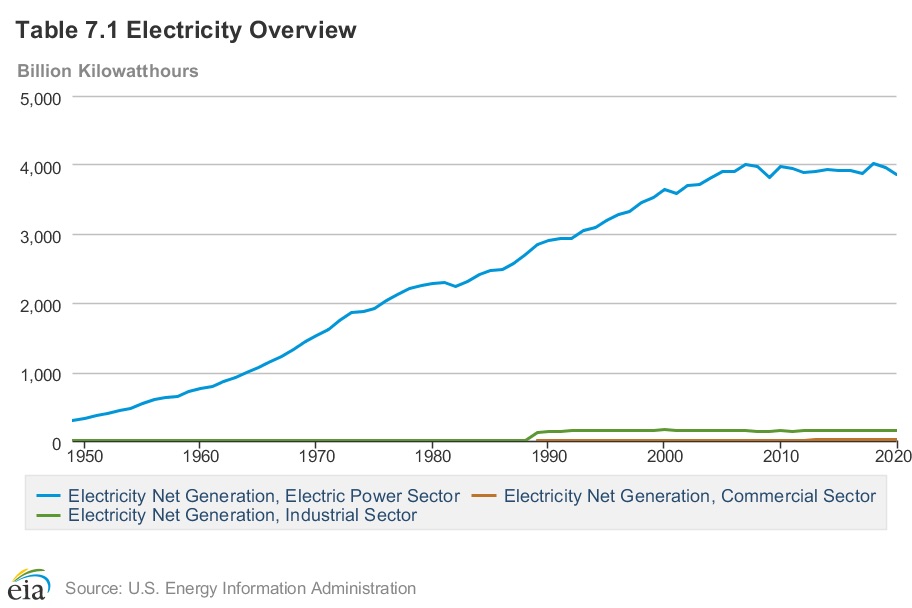
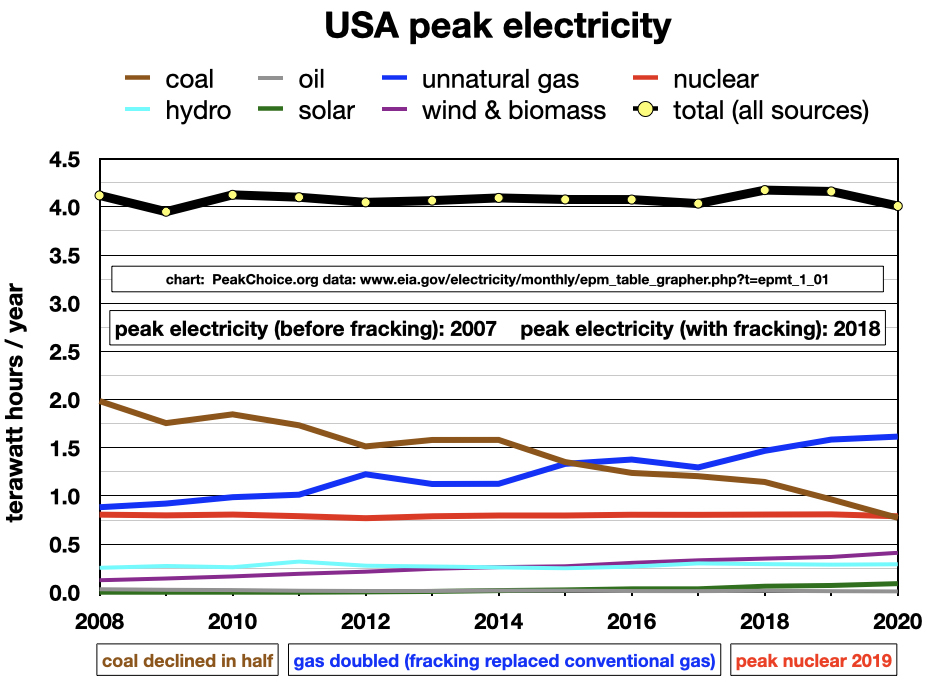
Oregon is a state where most people think dams provide the electricity, assuming that people think at all about where electricity comes from. But dams are only a fraction of the supply, partly because electricity use continues to grow and we've run out of locations for big dams. (Dams also disrupt river habitat and block salmon migration.)
Oroville dam in California shut down in August 2021 due to low water flow, the first time that has happened. It generated more electricity than all of the Willamette River watershed dams combined.
Lake Mead near Las Vegas is in sharp decline, with electrical generation dropping. It is possible Lake Mead could become Lake Mud, ending hydroelectric generation and threatening the water supply of Las Vegas.
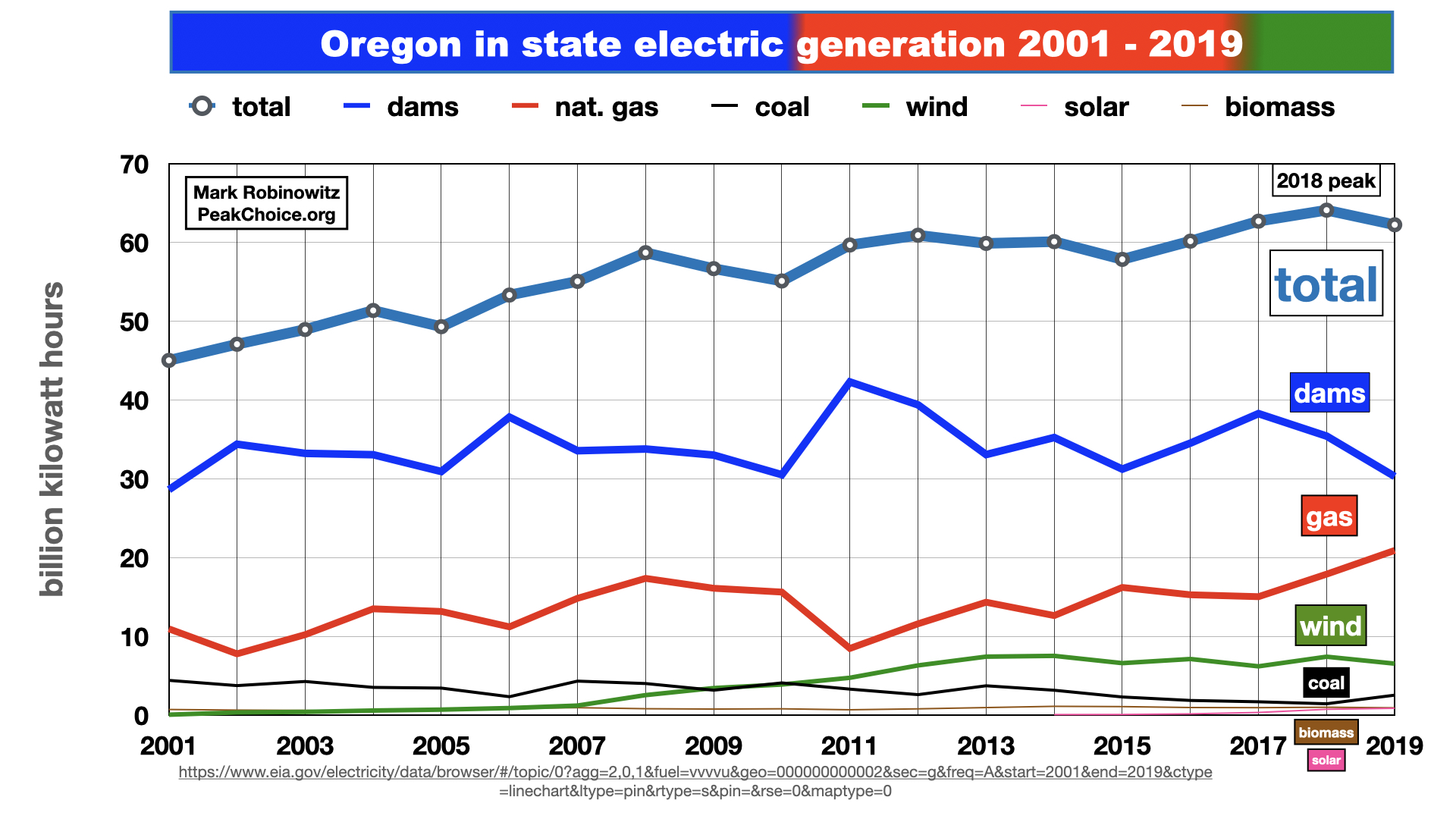
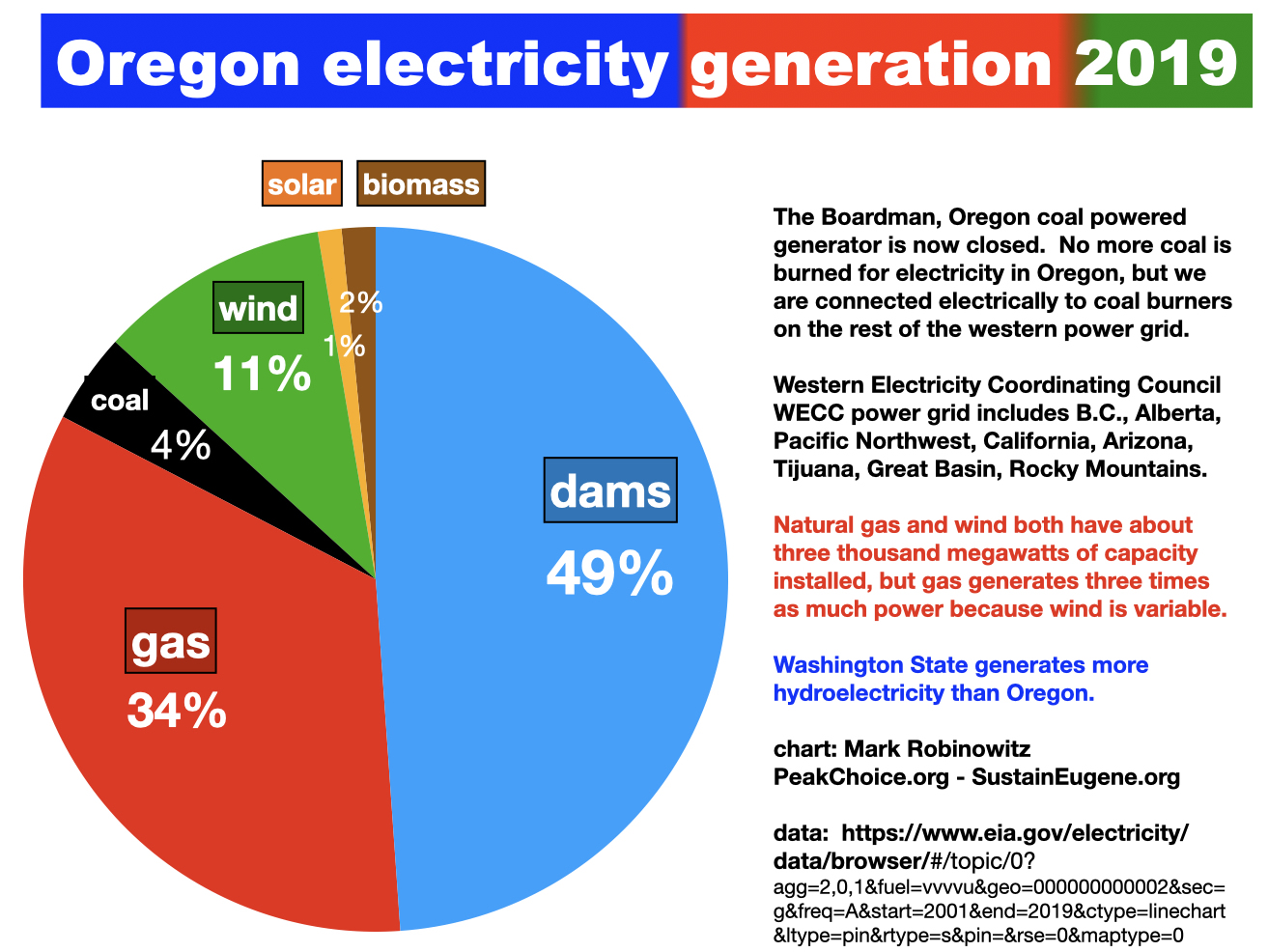
"No civilization can survive the physical destruction of its resource base."
-- Bruce Sterling"For the next half-century there will be just enough energy resources left to enable either a horrific and futile contest for the remaining spoils, or a heroic cooperative effort toward radical conservation and transition to a post-fossil-fuel energy regime.
"The next century will see the end of global geopolitics, one way or another. If our descendants are fortunate, the ultimate outcome will be a world of modest, bioregionally organized communities living on received solar energy."
-- Richard Heinberg, The US and Eurasia: End Game for the Industrial Era? www.museletter.com/archive/132.html

